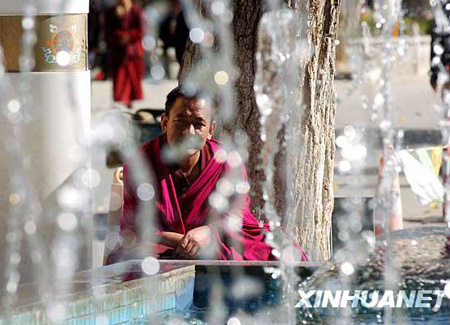Top 8 places for leisure and fun in Lhasa
|
|
|
Photo taken on Nov. 15, 2009 shows a Tibetan monk taking a break in front of a fountain in Lhasa, capital of southwest China's Tibet Autonomous Region. [Xinhua Photo] |
3. "Miandi" haircare shop
"Miandi" is a kind of hair dyeing method. It is a leisure activity popular among Lhasa residents for nearly 100 years. After entering a Miandi shop, a professional will cover your hair with medicine. In the 1 or 2 hours while waiting for the medicine to take effect, you can read a magazine or listen to Indian or Nepalese music.
Miandi is quite different from ordinary hair care methods. In a Miandi shop, clients cannot have their hair cut. Instead, they can only receive hair dyeing or hair care services. At the request of clients, professionals from Nepal sometimes use a thin rope to clean clients' faces. Hair dyeing costs 70 yuan. You will not witness any obvious hair improvement if you only go to a Miandi shop once or twice. After going there 5 times, you will see the magic effects of Miandi.
Tips: Miandi originated from India. It uses the roots of a kind of plant named Henna to dye people's hair. In India and Nepal, this kind of plant is used to do tattoos (to draw pictures on hands or faces) and dye hair. Hair is usually colored black, brown, orange or red. Miandi is regarded as the safest way to dye hair and it will not harm clients' health.
4. Zhuofanlin Shop
Most foreign tourists consider the Zhuofanlin Shop as a place they must visit in Lhasa. They look for the store as they walk on Barkhor Street with books and brief introductions to the shop in foreign languages in hand. They will be welcomed by various surprises when they finally reach the shop. However, few Chinese, who are always shopping for products among mountains of items on Barkhor Street, seem to be aware of the shop.
Tashi Nyima serves as the manager of the Zhuofanlin Shop. He found the job when he was studying in the U.S. through his university's website. Zhuofanlin has remained silently on Barkhor Street for eight years. Tashi Nyima said that few Chinese know the shop, and all of the information about the shop was written in travel guides and pamphlets in foreign languages.
 0
0 









Go to Forum >>0 Comments